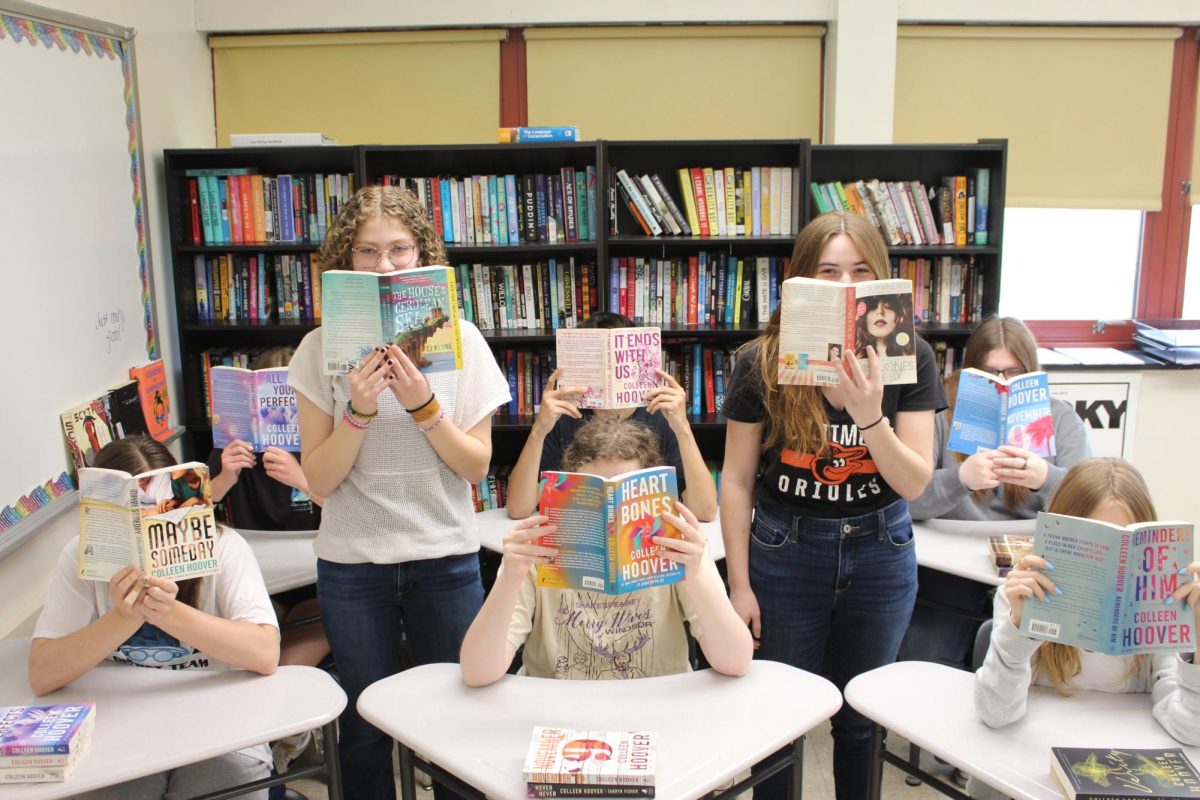For better or for worse, social media has become a part of every single aspect of everyone’s lives, including readers. This has led to the rise of online book communities, known as BookTok (book TikTok), Booktwt (book Twitter), and Bookstagram (book Instagram). Taking the world by storm in 2020, this undiverse, basic, and toxic form of reading has taken over the lives of millions of readers, publishing companies, and booksellers. A book will become popular on BookTok and immediately skyrocket to fame, with millions of social media users rushing to their Barnes & Noble, to grab the latest trend on the #booktok table. But the books often popularized by the community display toxic relationships, romanticize abuse, and create an overall undiversified environment of characters, authors, and readers.
Colleen Hoover’s book It Ends With Us is one of Booktok’s prodigies— emerging early in the community and one of the most commonly sought-after recommendations. The issue with Hoover is her romanticization of an abusive relationship within this book. One of the characters, Ryle, a charismatic surgeon, emotionally, physically, and sexually abuses the main character Lily, but his cruelty isn’t displayed as such. Rather, he is propped up as a flawed character, a good boyfriend, with slight faults that overlook his abusive nature. This display of character can be triggering, and harmful, and diminishes real people’s real-life experiences with abuse. However, it feels important to acknowledge that the book does end with Lily leaving Ryle, escaping the abuse she faced under him.
But Hoover doesn’t stop there. With unending fame from social media, and a platform to keep growing, Hoover takes It Ends With Us, and a variety of her other books (all of which feature similar themes), and capitalizes on them further, creating matching pajama sets, coloring books, and even nail polish, about these books and abusers she created. If that isn’t creating a light–hearted, romantic outlook on a serious and harmful problem we don’t know what is. It’s completely insensitive to people who have experienced abuse.
Without Booktok, It Ends With Us would be another bad book on the shelf, but it wouldn’t spread its harmful message of romanticizing abuse to millions of young, impressionable women, the target audience of Booktok. When this is the type of book that is recommended and read in mass numbers, it can alter people’s views, to the point where they start to romanticize abuse in real life.
Fourth Wing by Rebecca Yarros is currently the biggest trend on Booktok, and it does nothing to deserve the hype. There is no conflict, aside from the main character, Violet, just trying to survive another day in a dragon–based war college. Violet is perhaps the most annoying character ever to be written in fantasy. She complains all the time about how small and petite she is, and the only character trait she has is that the giant brooding, killing machine named Xaden, is attracted to her. While the world–building was good, Fourth Wing relies fully on “tropification” to carry the book.
Tropification is an effect of Booktok, where authors and publishers create a story solely on tropes, such as enemies–to–lovers because they know it’s marketable to the BookTok audience. This creates boring, plotless, two-dimensional, copy–and–paste stories that swarm BookTok with the same story over and over again. The formula is laughably obvious: A small, white woman, becomes the chosen one, but ultimately falls in love with the tall brooding man (typically portrayed as her enemy), who wins her heart by kidnapping her. A girl with glasses tutors a football player, who hates her until she takes off her glasses. She has to choose between two brothers, one who is a ray of sunshine, and one who hides in the shadows. It’s the same plot over and over because the authors know it will get popular on BookTok, and at this point BookTok is fueling most book sales.
Having a character go through copious amounts of trauma does not always translate to a well–crafted character. Good worldbuilding does not always translate to having good prose, and good prose does not always translate to having a good plot. There is so much more that goes into writing a story than just formulating trope–able characters and a half–baked plot. Good ideas don’t always translate into good stories. Engaging critically with the text you read is how we figure that out, how we make sure authors are giving us a good craft. Writing is a form of entertainment too, and just like we’d do a poorly crafted show, we should always be questioning the things we read, even if we enjoy those things.
It’s not just the same plot every time, but it’s the same authors, the same readers, and the same characters. BookTok is one of the most non-diverse communities on social media. Most of the content creators are white middle-aged women. Most of BookTok’s successful authors are white, straight, middle-aged women. According to Words Rated, Colleen Hoover and Emily Henry, BookTok famous romance authors, together make 80% of romance book sales, and romance is the most sold genre. Both of these authors are white, and all of their main characters are white. This isn’t a unique case, in fact, it is the most common, with 92.2% of romance authors being white. And the most popular main characters are petite, straight white women with swords. This creates a singular, extremely narrow perspective in books. If books aren’t written about characters from different backgrounds, we can never hope to expand our knowledge and understand people other than us. This singular point of view also shuts people out. Books are meant to be a home and a safe place, but when they are only written by, for, and to straight white women, it denies anyone that isn’t, a safe place.
Black authors are also finding it difficult to emerge and become successful in the BookTok community. Because the audience is so trained in this singular perspective, they are not willing to read books with Black authors, or characters. The lack of popular Black authors on BookTok is a mirror image of the lack of Black authors who are given the space to succeed in the book industry as a whole. BookTok, because of its overwhelming influence on book sales, has the power to change that.
According to The Cut, “These algorithmic problems combine to stack the deck in favor of white authors. They already have an advantage in selling and marketing a book, but the app allows white authors to find an audience of white creators on TikTok, who then create the conversation other users feel obligated to keep up with, which exposes the book to wider audiences. It’s a cycle that leads to both incredible individual success and the suppression of marginalized voices.” If BookTok gave space for different stories, it could skyrocket these stories and authors to fame.
A disturbingly large part of these non–diverse stories is the absolute insanity that is “smut.” Smut, or “spicy scenes,” terms that BookTok has given to a book that is full of sexually explicit content, has taken social media apps, and book sales by storm. On Goodreads “Best Books from BookTok” list over half of the titles have a considerate amount of smut, and the hastag #smut, has garnered 450,000 posts, reels, and TikTok’s across all platforms, according to The Harvard Crimson Although that type of book can be nice for a mind-numbing read, it cannot be the only thing you read. Books are meant to expand the mind, and smut isn’t doing that. If a person enjoys smut it’s okay to read it, but it becomes a problem when that is the only thing someone reads or recommends. Only reading those books can be toxic, and oftentimes these are the only books content creators recommend.
Writing has always been about asking questions; prodding here and there, critiquing. It has always been a conversation, a dialogue. We urge people to love what they read, and read what they love, but always ask questions, always understand different perspectives, and always keep your mind open. Understand that everyone will not come out with the same reading experience as you: It doesn’t make their experience any less valid than yours.
BookTok is a danger to diversity and healthy reading, but it does have its good moments. I’ve personally really loved Song of Achilles, These Violent Delights, The House in the Cerulean Sea, Daisy Jones & The Six, The Seven Husbands of Evelyn Hugo, The Invisible Life of Addie LaRue, and Once Upon a Broken Heart, all BookTok favorites. There are content creators, who promote diverse books, and there are genuinely fantastic books that will change the way you perceive the world on BookTok, but the problem is you have to look past the smut, the toxic relationships, tropification, and non–diversity, to find the needle in the haystack.































































































